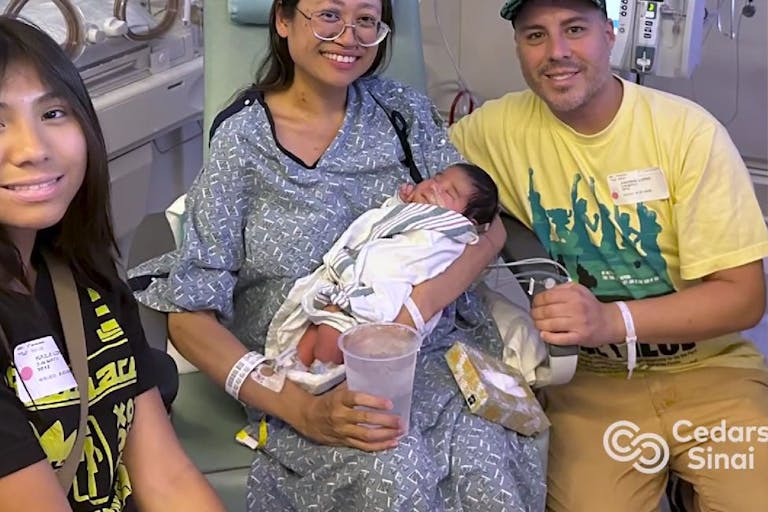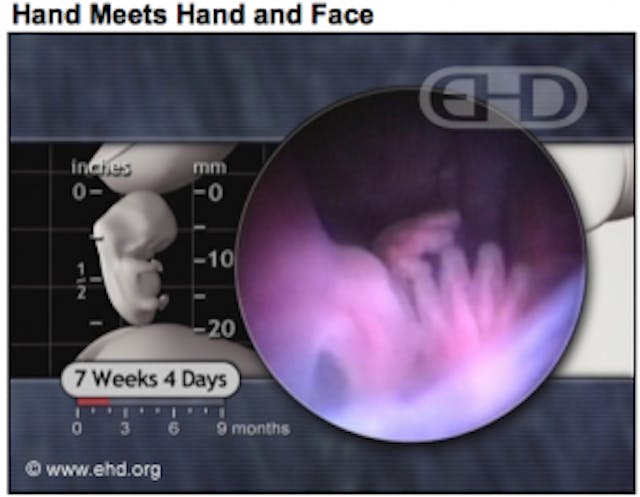
Full term 'miracle' baby born after 'unprecedented' ectopic pregnancy
Bridget Sielicki
·
Real reproductive justice encourages complete information and facilitates life-affirming options
Editor’s Note: Over the next three weeks, we will be sharing with you a series of articles on Reproductive Justice, written by Americans United for Life in March of 2010. They have kindly granted us permission to reprint here. In this article, abortion restrictions are discussed. While Live Action knows that accurate information on abortion dangers and fetal development is essential, the ultimate goal is to stop the abortion of all babies.
“The doctor never conferred with me. ” “I wasn’t given any information on what they were going to do or how. I was just taken in and taken care of, as they put it. I was never given the choice of whether I would allow adoption or anything.” “He never told me how big my baby was or any of the complications that could happen and he certainly didn’t tell me the aftereffects.”
These are real women’s stories — stories of women who underwent abortions, trusting the person with “Doctor” before his or her name. Regrettably, that trust was grossly misplaced in an industry where paternalistic attitudes pervade and where profits and an adherence to a radical pro-abortion ideology are placed above women’s health and well-being.
Since the 1980s, pro-life advocates and others concerned with abortion’s impact on women have worked to enact informed consent laws. Fully-informed consent for abortion necessarily includes information about the risks, complications, and alternatives to abortion. It means that a woman must fully understand the procedure to be performed and its potential consequences. Today, 32 states have enforceable informed consent laws, protecting women and their right to make fully-informed choices about their pregnancies.
In recent years, many states have enhanced their existing informed consent laws by enacting ultrasound requirements, requiring counseling about fetal pain, informing women of the link between abortion and breast cancer, and ensuring that women are not coerced into submitting to abortions. An increasing number of states are also directly and indirectly supporting and subsidizing abortion alternatives including adoption services and the work of pregnancy care centers.

Today, women are being given more information and more options. They are being empowered and, as reflected in the decreasing abortion rate, are increasingly choosing life-affirming options.
So, how are abortion advocates reacting to this turn of events? Are they applauding the empowerment of women who are finally being given the necessary information and support to make the best “choice” for them? Not surprisingly, abortion advocates are reacting with vitriol and slander, seeking to advance their ideology and to protect their “market share” by limiting women’s information and options.
Article continues below
Dear Reader,
Have you ever wanted to share the miracle of human development with little ones? Live Action is proud to present the "Baby Olivia" board book, which presents the content of Live Action's "Baby Olivia" fetal development video in a fun, new format. It's perfect for helping little minds understand the complex and beautiful process of human development in the womb.
Receive our brand new Baby Olivia board book when you give a one-time gift of $30 or more (or begin a new monthly gift of $15 or more).
Abortion advocates routinely refer to informed consent laws as “biased counseling requirements” simply because they require that women be counseled about options other than abortion. They disingenuously argue that informed consent laws require that women be given unnecessary and “medically inaccurate information,” despite the fact that these laws specifically require medically accurate information that “a reasonable patient would consider material to the decision of whether or not to undergo an abortion.” They also argue that informed consent laws treat women as if they are “stupid” and in need of state-sanctioned “protection,” when it is the abortion industry itself that perpetuates paternalism and misogyny by seeking to limit the information women receive to that which promotes abortion as the only rational or reasonable choice.

Tellingly, abortion advocates save much of their venom for pregnancy care centers. Each year, the reach and influence of these centers grow as more centers open, as public opinion on abortion increasingly shifts to a pro-life ethic, and as the centers receive much-deserved attention for their life-affirming work. Importantly, many state legislatures around the country are now supporting pregnancy care centers through specialty vehicle license plate programs and direct taxpayer-funded subsidies.
Thousands of pregnancy care centers across the nation equip women with complete and accurate information regarding their pregnancy options and the development of their unborn children, while also providing them with compassionate, confidential, and nonjudgmental counseling and support regardless of their pregnancy outcomes. Notably, abortion advocates cannot say the same.

Instead, abortion advocates insist on referring to pregnancy care centers as “fake clinics” and accusing them of intentionally misleading and misinforming women. In recent years, they have even tried to subject them to unnecessary and ideologically-biased regulation and oversight intended to shut them down. Thankfully, these efforts have been largely unsuccessful.
From the evidence, it is easy to see who is fighting for real reproductive justice and who is fighting an ideologically-driven misinformation campaign designed to limit women’s freedom and choices.
Other posts in this series:
Live Action News is pro-life news and commentary from a pro-life perspective.
Contact editor@liveaction.org for questions, corrections, or if you are seeking permission to reprint any Live Action News content.
Guest Articles: To submit a guest article to Live Action News, email editor@liveaction.org with an attached Word document of 800-1000 words. Please also attach any photos relevant to your submission if applicable. If your submission is accepted for publication, you will be notified within three weeks. Guest articles are not compensated (see our Open License Agreement). Thank you for your interest in Live Action News!

Bridget Sielicki
·
Analysis
Angeline Tan
·
Analysis
Cassy Cooke
·
Politics
Madison Evans
·
Opinion
Nancy Flanders
·
Investigative
Carole Novielli
·